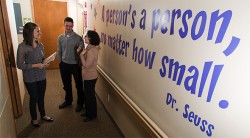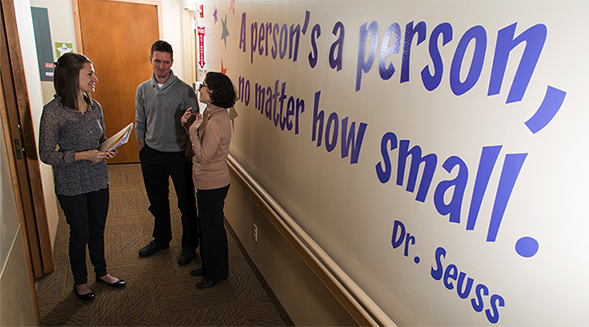 Mentor and student collaborate to provide needed service in central Iowa
Mentor and student collaborate to provide needed service in central Iowa
When Emily Madsen, a senior psychology major with a concentration in applied behavior analysis, describes her internship with the Behavioral Disorders Clinic at Blank Children’s Hospital in Des Moines, her speech quickens and her eyes take on a special brilliance.
“My whole life I’ve known I want to help people,” says Madsen, an honors student who will graduate this December. “For a while I thought it sounded cliché and maybe even a little silly. But I’ve been told that actually, not everyone wants to do that.”
Madsen and her academic adviser, Maria Valdovinos, associate professor of psychology, run the daily operations of the Behavioral Disorders Clinic that is part of the hospital’s Developmental Center. When Madsen originally asked Valdovinos about doing an internship at the Developmental Center, there weren’t any—so Valdovinos worked to create one.
“Dr. V has opened a lot of doors for me; this internship and research opportunities in the past,” says Madsen. “She’s really interested in giving students opportunities to discover who they are professionally, academically, and personally.”
Within a few weeks of Madsen’s inquiry Valdovinos secured a meeting with the Center’s medical director and they decided to collaborate: Valdovinos would establish and run a new Behavioral Clinic as a component of the Development Center and Madsen would assist her. Families are not billed for behavior therapy, which means Valdovinos is not compensated. But there are other rewards.
“As professors the three things we focus on most are teaching, research, and service. Not just service to the University but also to the community. This opportunity touches all three areas,” Valdovinos says.
Contributing to clinical care
At the Developmental Center, Madsen and Valdovinos are surrounded by bright colors, sensory stimulus toys, and walls painted with quotes from Dr. Seuss—an environment that almost belies the critical role they play in patients’ comprehensive care.
“Our goal is to consolidate care for kids with developmental disabilities in central Iowa,” says Dr. Nate Noble, medical director of the Developmental Center at Blank Children’s Hospital. “Before this Center [which opened in January 2012] families had to drive to eastern Iowa for services. The biggest city in the state had no clinic for kids with developmental disabilities.”
Noble and his colleagues diagnose and treat children who have a range of cognitive and physiological disabilities. Approximately 40 percent of their patients have autism, which often comes with disruptive behaviors such as aggression, self-injury, and noncompliance. Addressing the behavior is a key component of care for these children—and it’s where Valdovinos and Madsen add real value.
“I can talk about behavior interventions from thirty-thousand feet but I can’t make it tangible for families,” says Noble. “Maria does. She brings [behavior interventions] to the level of the people.”
Understanding the big picture
As mentor and student, Valdovinos and Madsen work together to create behavior plans for patients referred by Noble and help patients’ family members (usually parents) become confident in carrying out interventions at home and advocating for their children in other settings such as school.
While Valdovinos, one of only a few certified behavior analysts in Iowa, conducts the therapy sessions with the patients and families, Madsen does the pre- and post-session work: Prior to therapy she conducts an assessment with the family over the phone, coordinates paperwork, and collaborates with Valdovinos to form a hypothesis about what is going on with the patient and what evidenced–based interventions may alleviate the problem behavior(s). After therapy, Madsen and Valdovinos provide families with a report that includes feedback to the parents and a behavior plan they can implement at home. A few months later, the families return for a follow up appointment with Noble who helps them assess whether or not the plan is working.
“Working at the clinic has exposed me to what services families require and has helped me understand what families are going through,” says Madsen. “In the clinic I’m seeing the bigger picture—not just applied behavior analysis. Collaborating with the bigger team gives me a better idea of what I’ll be stepping into professionally.”
Parting thoughts
Madsen graduates from Drake in a little less than a month. And although her next step is still unclear because she is deciding between two job offers, she is certain about one thing: The opportunities Drake has provided to her have not only grown her both personally and professionally, but the number and depth of experiences she has been afforded have been extraordinary.
“I can’t stress enough the importance of taking advantage of all the opportunities Drake provides. I really appreciate Drake and the psych department for the opportunities to practice what I’ve learned,” says Madsen.
– Sherry Speikers, GR’93


